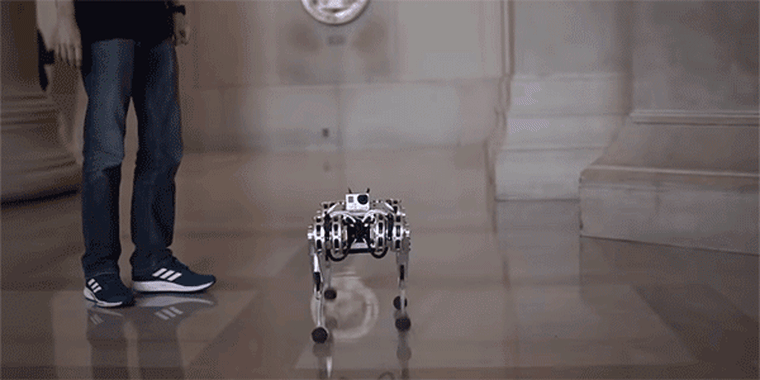We've seen robots run, jump, perform somersaults — we've even seen a robot do parkour. But the scientists behind the "Mini Cheetah" robot say it's the first four-legged bot to do a backflip — and they have video to back up the claim.
With joints that are as free-moving as they are springy, the 20-pound, battery-powered robot is remarkably agile. It can move forward, backward and even in an unnerving sort of sidestep gait — and can even move upside down.
While it's no match for its flesh-and-blood namesake, Mini Cheetah is also pretty fast. Over rough terrain, it can trot about twice as fast as a human can walk. If it falls — or gets kicked around by some curious human — the robot quickly regains its footing, as you can see in the video, which was posted to YouTube on Feb. 28.
Constructed as a research project, Mini Cheetah shares its design principles from a much bigger quadrupedal robot called Cheetah 3. "Having a platform that's relatively small and safe and cheap makes running experiments very easy — you don't have to worry about breaking the robot or getting hurt," Ben Katz, a technical associate in MIT's department of mechanical engineering and the robot's designer and builder, said in an email.
Cheetah 3 has done a backflip "in simulation," Katz said. But, he added, "Imagine a 90-pound piece of metal spinning through the air — that's not a test to you want to test out for the first time on the real robot."
There are no plans to make Mini Cheetah commercially available, according to Katz. Instead, the team behind the robot plans to build multiple copies of the bot and loan them to other research groups.
Future versions of Mini Cheetah will be equipped with a camera so the robot can see its surroundings, Sangbae Kim, an associate professor of mechanical engineering at MIT and the researcher overseeing the project, said in an email.
"Eventually, I'm hoping we could have a robotic dog race through an obstacle course, where each team controls a Mini Cheetah with different algorithms, and we can see which strategy is more effective," he said in a statement. "That's how you accelerate research."
